Analyzing Brexit: Impacts on Pharmaceutical Regulatory Affairs
VerifiedAdded on 2023/04/19
|18
|4350
|268
Report
AI Summary
This report provides a detailed analysis of Brexit and its impacts, particularly focusing on the regulatory affairs of pharmaceutical companies in the United Kingdom. It discusses the causes of Brexit, stemming from historical context and media influence, and explores the subsequent effects on funding for innovation, regulations on medical devices, clinical trials, manufacturing, and employment within the pharmaceutical industry. The report highlights how Brexit has led to changes in laws and standards, affecting the ability of pharmaceutical companies to operate and innovate, resulting in potential migration to other European countries like Ireland. It also touches upon the loss of the UK's status as a research leader in the pharmaceutical sector due to altered funding landscapes. The legislative perspectives and the overall economic shockwaves caused by Brexit are also examined, providing a comprehensive overview of the challenges and changes faced by the pharmaceutical sector in the wake of the UK's departure from the European Union. Desklib offers a platform for students to access this and many other solved assignments.
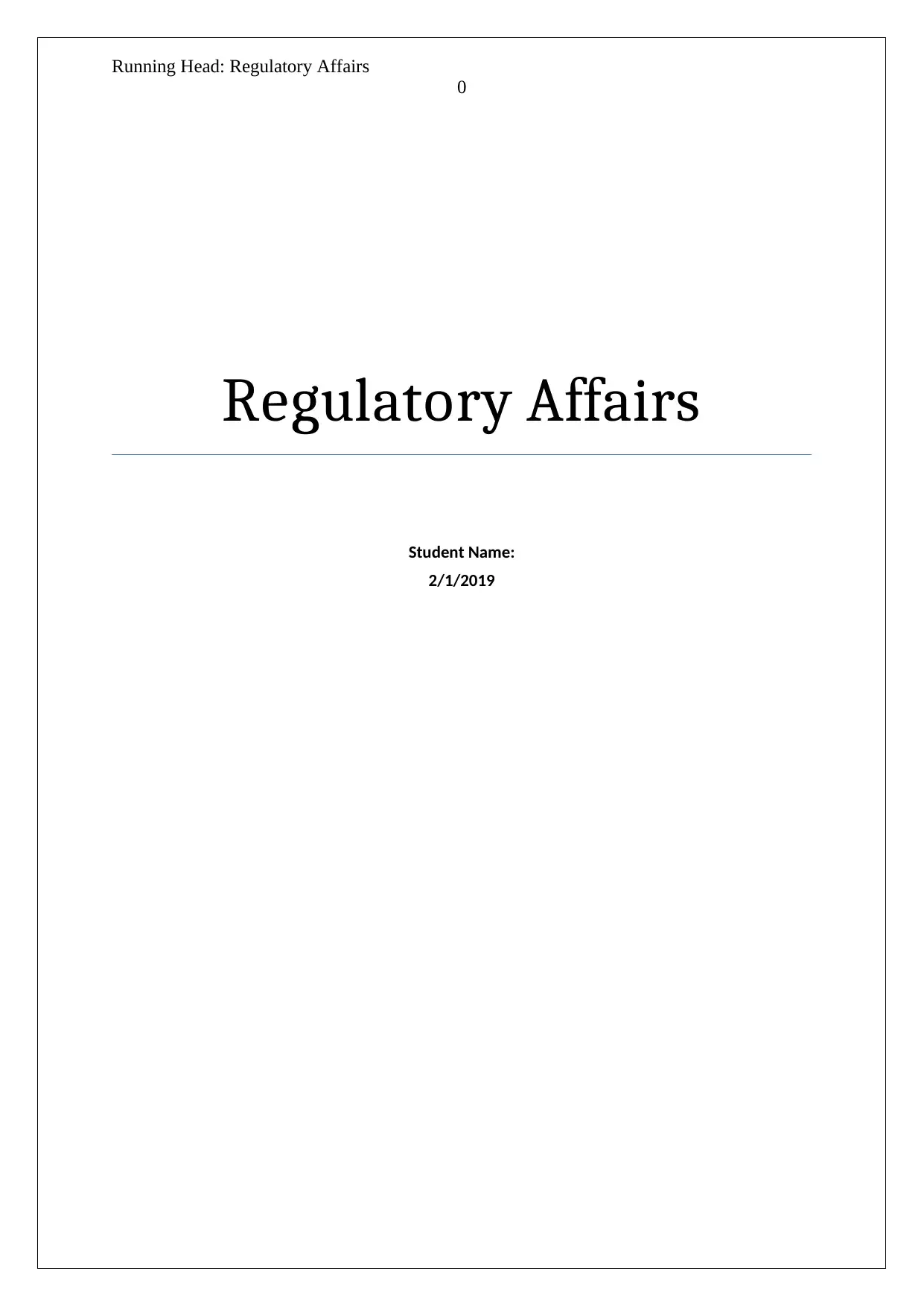
Running Head: Regulatory Affairs
0
Regulatory Affairs
Student Name:
2/1/2019
0
Regulatory Affairs
Student Name:
2/1/2019
Paraphrase This Document
Need a fresh take? Get an instant paraphrase of this document with our AI Paraphraser

Regulatory Affairs 1
Contents
Introduction......................................................................................................................................2
What is Brexit?.................................................................................................................................3
Impacts of Brexit..............................................................................................................................4
Causes of Brexit...............................................................................................................................7
Legislative Perspective of Brexit?.................................................................................................10
Conclusion......................................................................................................................................13
Contents
Introduction......................................................................................................................................2
What is Brexit?.................................................................................................................................3
Impacts of Brexit..............................................................................................................................4
Causes of Brexit...............................................................................................................................7
Legislative Perspective of Brexit?.................................................................................................10
Conclusion......................................................................................................................................13
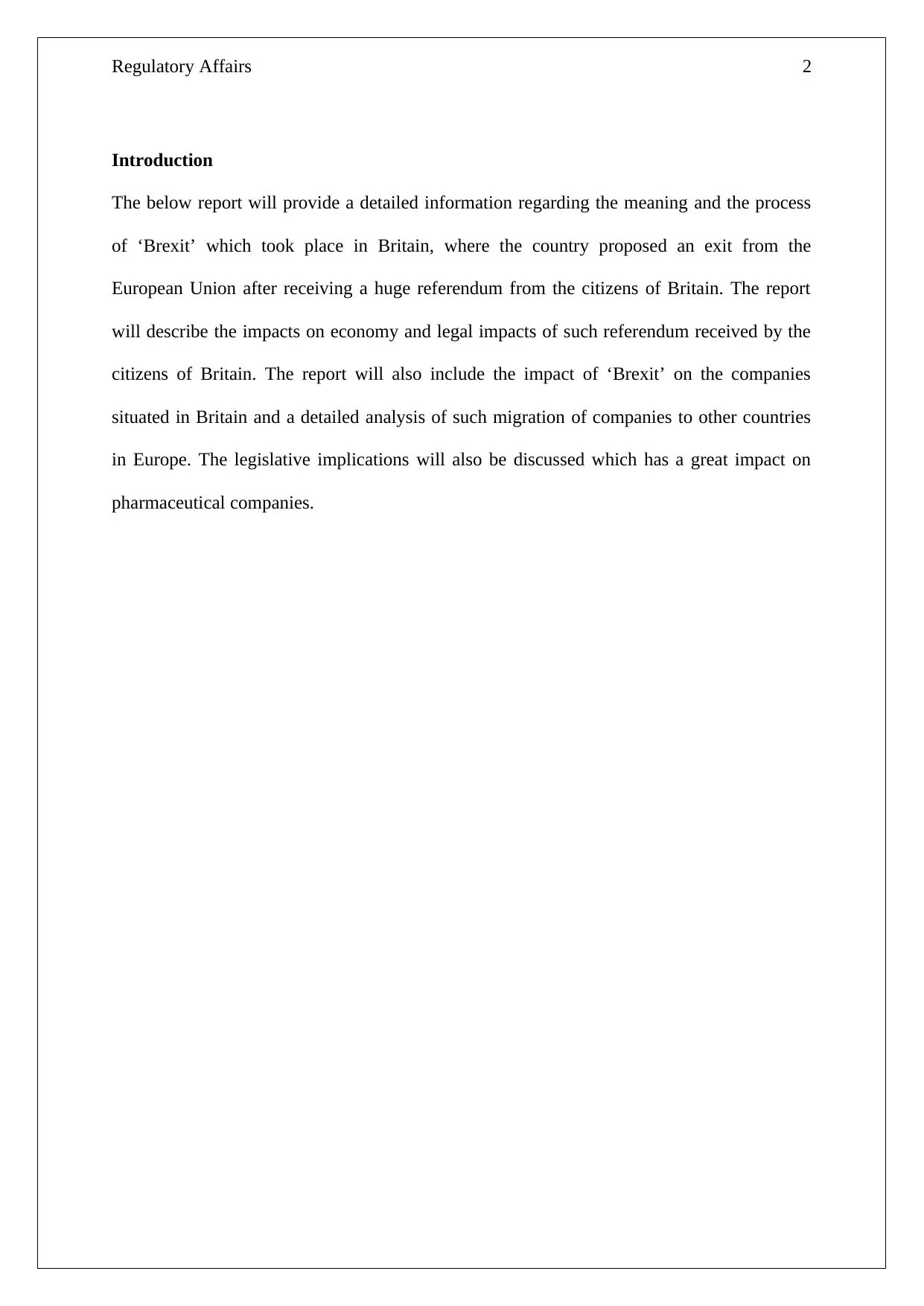
Regulatory Affairs 2
Introduction
The below report will provide a detailed information regarding the meaning and the process
of ‘Brexit’ which took place in Britain, where the country proposed an exit from the
European Union after receiving a huge referendum from the citizens of Britain. The report
will describe the impacts on economy and legal impacts of such referendum received by the
citizens of Britain. The report will also include the impact of ‘Brexit’ on the companies
situated in Britain and a detailed analysis of such migration of companies to other countries
in Europe. The legislative implications will also be discussed which has a great impact on
pharmaceutical companies.
Introduction
The below report will provide a detailed information regarding the meaning and the process
of ‘Brexit’ which took place in Britain, where the country proposed an exit from the
European Union after receiving a huge referendum from the citizens of Britain. The report
will describe the impacts on economy and legal impacts of such referendum received by the
citizens of Britain. The report will also include the impact of ‘Brexit’ on the companies
situated in Britain and a detailed analysis of such migration of companies to other countries
in Europe. The legislative implications will also be discussed which has a great impact on
pharmaceutical companies.
⊘ This is a preview!⊘
Do you want full access?
Subscribe today to unlock all pages.

Trusted by 1+ million students worldwide

Regulatory Affairs 3
What is Brexit?
It is basically a short form of ‘British exit’ used by various institutions and agencies and
institutions which refers to the decision made by the United Kingdom on 23rd June 2016.
Such abbreviation was made with the abbreviation used at the time of “Grexit’ where Greece
exit from the Eurozone. The term ‘Brexit’ refers to the action made by Britain to exit from
Eurozone. The action was made on the basis of the referendum made by the citizens of the
United Kingdom (Menon and Salter, 2016). The Cameron government of England decided to
call for a referendum from the public which has helped them in deciding such actions. Upon
receiving such a huge referendum by the citizens of the United Kingdom has led to such an
act by the country. It can be noted that the then Prime Minister of Britain David Cameron
who campaigned for Britain to remain in the Eurozone. Upon such wide campaign, the
citizens of the country gave such referendum regarding the exit from the European Union, as
a result, Prime Minister David Cameron decided to step down from the post of Prime
Minister (Sampson, 2016).
It shall also be noted that Britain joined the Eurozone back in the year 1973 under the
government of Edward Health. The referendum in favour of Brexit was 51.9 per cent of the
total population of the country which has resulted in the Brexit for the country.
What is Brexit?
It is basically a short form of ‘British exit’ used by various institutions and agencies and
institutions which refers to the decision made by the United Kingdom on 23rd June 2016.
Such abbreviation was made with the abbreviation used at the time of “Grexit’ where Greece
exit from the Eurozone. The term ‘Brexit’ refers to the action made by Britain to exit from
Eurozone. The action was made on the basis of the referendum made by the citizens of the
United Kingdom (Menon and Salter, 2016). The Cameron government of England decided to
call for a referendum from the public which has helped them in deciding such actions. Upon
receiving such a huge referendum by the citizens of the United Kingdom has led to such an
act by the country. It can be noted that the then Prime Minister of Britain David Cameron
who campaigned for Britain to remain in the Eurozone. Upon such wide campaign, the
citizens of the country gave such referendum regarding the exit from the European Union, as
a result, Prime Minister David Cameron decided to step down from the post of Prime
Minister (Sampson, 2016).
It shall also be noted that Britain joined the Eurozone back in the year 1973 under the
government of Edward Health. The referendum in favour of Brexit was 51.9 per cent of the
total population of the country which has resulted in the Brexit for the country.
Paraphrase This Document
Need a fresh take? Get an instant paraphrase of this document with our AI Paraphraser
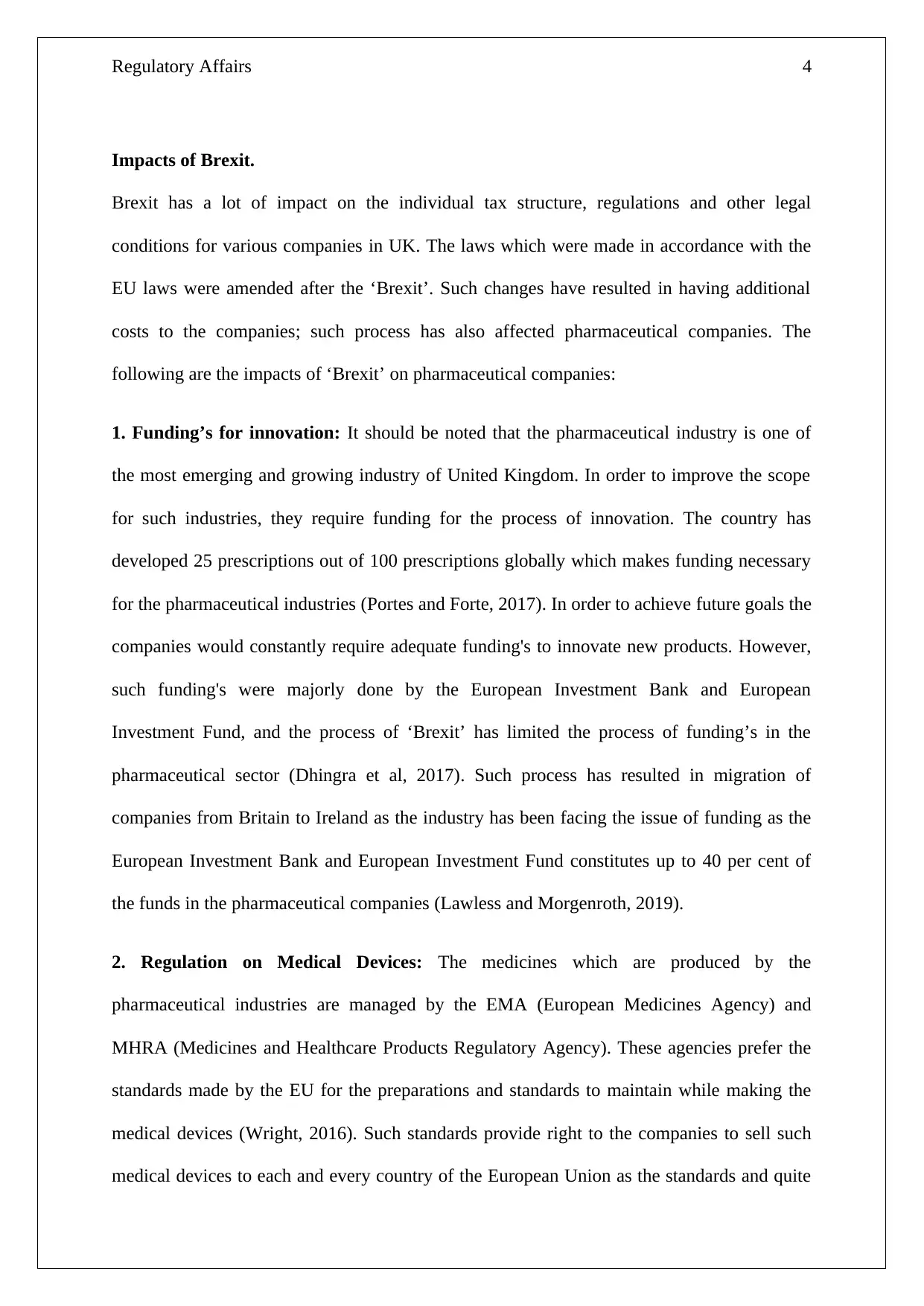
Regulatory Affairs 4
Impacts of Brexit.
Brexit has a lot of impact on the individual tax structure, regulations and other legal
conditions for various companies in UK. The laws which were made in accordance with the
EU laws were amended after the ‘Brexit’. Such changes have resulted in having additional
costs to the companies; such process has also affected pharmaceutical companies. The
following are the impacts of ‘Brexit’ on pharmaceutical companies:
1. Funding’s for innovation: It should be noted that the pharmaceutical industry is one of
the most emerging and growing industry of United Kingdom. In order to improve the scope
for such industries, they require funding for the process of innovation. The country has
developed 25 prescriptions out of 100 prescriptions globally which makes funding necessary
for the pharmaceutical industries (Portes and Forte, 2017). In order to achieve future goals the
companies would constantly require adequate funding's to innovate new products. However,
such funding's were majorly done by the European Investment Bank and European
Investment Fund, and the process of ‘Brexit’ has limited the process of funding’s in the
pharmaceutical sector (Dhingra et al, 2017). Such process has resulted in migration of
companies from Britain to Ireland as the industry has been facing the issue of funding as the
European Investment Bank and European Investment Fund constitutes up to 40 per cent of
the funds in the pharmaceutical companies (Lawless and Morgenroth, 2019).
2. Regulation on Medical Devices: The medicines which are produced by the
pharmaceutical industries are managed by the EMA (European Medicines Agency) and
MHRA (Medicines and Healthcare Products Regulatory Agency). These agencies prefer the
standards made by the EU for the preparations and standards to maintain while making the
medical devices (Wright, 2016). Such standards provide right to the companies to sell such
medical devices to each and every country of the European Union as the standards and quite
Impacts of Brexit.
Brexit has a lot of impact on the individual tax structure, regulations and other legal
conditions for various companies in UK. The laws which were made in accordance with the
EU laws were amended after the ‘Brexit’. Such changes have resulted in having additional
costs to the companies; such process has also affected pharmaceutical companies. The
following are the impacts of ‘Brexit’ on pharmaceutical companies:
1. Funding’s for innovation: It should be noted that the pharmaceutical industry is one of
the most emerging and growing industry of United Kingdom. In order to improve the scope
for such industries, they require funding for the process of innovation. The country has
developed 25 prescriptions out of 100 prescriptions globally which makes funding necessary
for the pharmaceutical industries (Portes and Forte, 2017). In order to achieve future goals the
companies would constantly require adequate funding's to innovate new products. However,
such funding's were majorly done by the European Investment Bank and European
Investment Fund, and the process of ‘Brexit’ has limited the process of funding’s in the
pharmaceutical sector (Dhingra et al, 2017). Such process has resulted in migration of
companies from Britain to Ireland as the industry has been facing the issue of funding as the
European Investment Bank and European Investment Fund constitutes up to 40 per cent of
the funds in the pharmaceutical companies (Lawless and Morgenroth, 2019).
2. Regulation on Medical Devices: The medicines which are produced by the
pharmaceutical industries are managed by the EMA (European Medicines Agency) and
MHRA (Medicines and Healthcare Products Regulatory Agency). These agencies prefer the
standards made by the EU for the preparations and standards to maintain while making the
medical devices (Wright, 2016). Such standards provide right to the companies to sell such
medical devices to each and every country of the European Union as the standards and quite
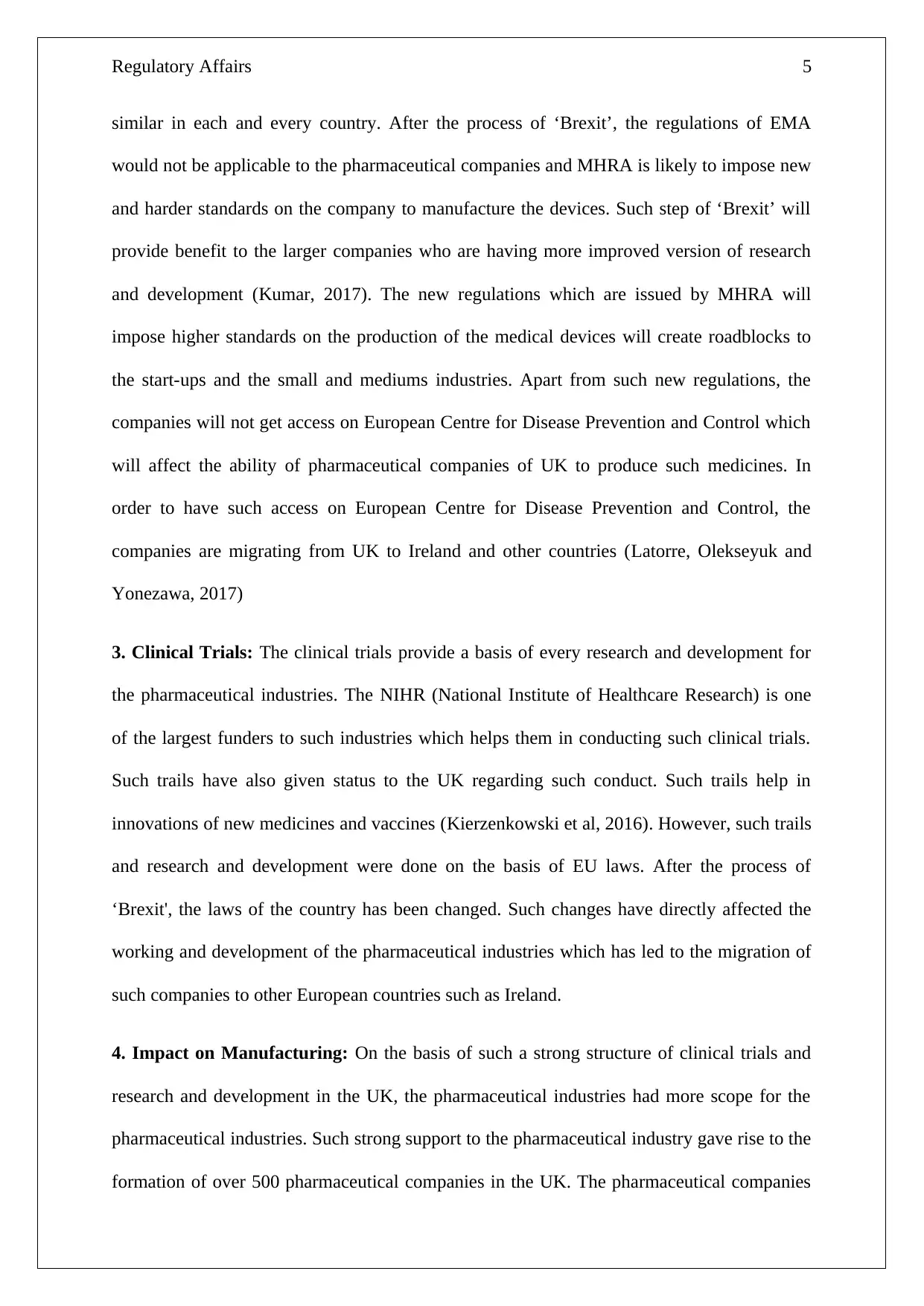
Regulatory Affairs 5
similar in each and every country. After the process of ‘Brexit’, the regulations of EMA
would not be applicable to the pharmaceutical companies and MHRA is likely to impose new
and harder standards on the company to manufacture the devices. Such step of ‘Brexit’ will
provide benefit to the larger companies who are having more improved version of research
and development (Kumar, 2017). The new regulations which are issued by MHRA will
impose higher standards on the production of the medical devices will create roadblocks to
the start-ups and the small and mediums industries. Apart from such new regulations, the
companies will not get access on European Centre for Disease Prevention and Control which
will affect the ability of pharmaceutical companies of UK to produce such medicines. In
order to have such access on European Centre for Disease Prevention and Control, the
companies are migrating from UK to Ireland and other countries (Latorre, Olekseyuk and
Yonezawa, 2017)
3. Clinical Trials: The clinical trials provide a basis of every research and development for
the pharmaceutical industries. The NIHR (National Institute of Healthcare Research) is one
of the largest funders to such industries which helps them in conducting such clinical trials.
Such trails have also given status to the UK regarding such conduct. Such trails help in
innovations of new medicines and vaccines (Kierzenkowski et al, 2016). However, such trails
and research and development were done on the basis of EU laws. After the process of
‘Brexit', the laws of the country has been changed. Such changes have directly affected the
working and development of the pharmaceutical industries which has led to the migration of
such companies to other European countries such as Ireland.
4. Impact on Manufacturing: On the basis of such a strong structure of clinical trials and
research and development in the UK, the pharmaceutical industries had more scope for the
pharmaceutical industries. Such strong support to the pharmaceutical industry gave rise to the
formation of over 500 pharmaceutical companies in the UK. The pharmaceutical companies
similar in each and every country. After the process of ‘Brexit’, the regulations of EMA
would not be applicable to the pharmaceutical companies and MHRA is likely to impose new
and harder standards on the company to manufacture the devices. Such step of ‘Brexit’ will
provide benefit to the larger companies who are having more improved version of research
and development (Kumar, 2017). The new regulations which are issued by MHRA will
impose higher standards on the production of the medical devices will create roadblocks to
the start-ups and the small and mediums industries. Apart from such new regulations, the
companies will not get access on European Centre for Disease Prevention and Control which
will affect the ability of pharmaceutical companies of UK to produce such medicines. In
order to have such access on European Centre for Disease Prevention and Control, the
companies are migrating from UK to Ireland and other countries (Latorre, Olekseyuk and
Yonezawa, 2017)
3. Clinical Trials: The clinical trials provide a basis of every research and development for
the pharmaceutical industries. The NIHR (National Institute of Healthcare Research) is one
of the largest funders to such industries which helps them in conducting such clinical trials.
Such trails have also given status to the UK regarding such conduct. Such trails help in
innovations of new medicines and vaccines (Kierzenkowski et al, 2016). However, such trails
and research and development were done on the basis of EU laws. After the process of
‘Brexit', the laws of the country has been changed. Such changes have directly affected the
working and development of the pharmaceutical industries which has led to the migration of
such companies to other European countries such as Ireland.
4. Impact on Manufacturing: On the basis of such a strong structure of clinical trials and
research and development in the UK, the pharmaceutical industries had more scope for the
pharmaceutical industries. Such strong support to the pharmaceutical industry gave rise to the
formation of over 500 pharmaceutical companies in the UK. The pharmaceutical companies
⊘ This is a preview!⊘
Do you want full access?
Subscribe today to unlock all pages.

Trusted by 1+ million students worldwide
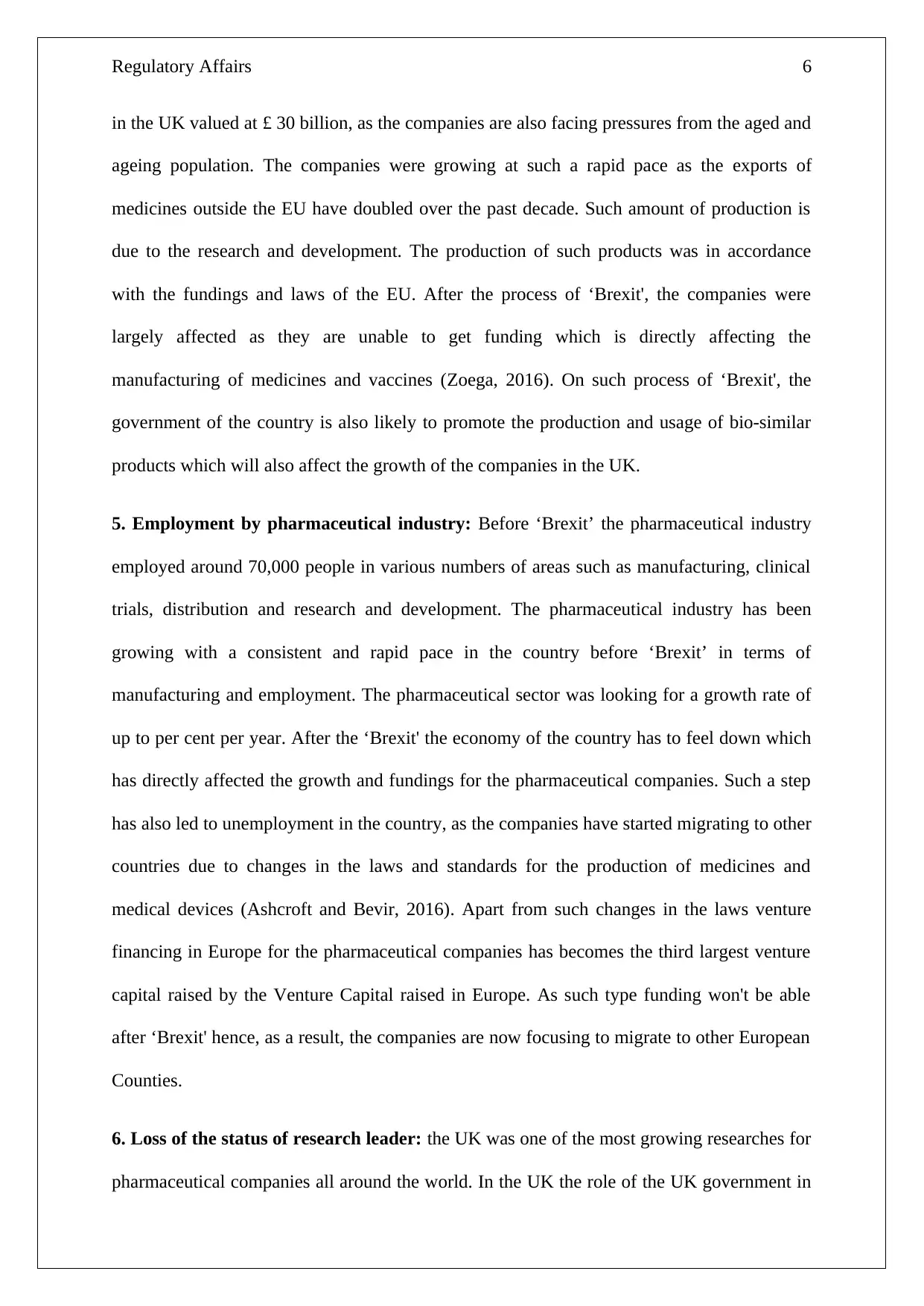
Regulatory Affairs 6
in the UK valued at £ 30 billion, as the companies are also facing pressures from the aged and
ageing population. The companies were growing at such a rapid pace as the exports of
medicines outside the EU have doubled over the past decade. Such amount of production is
due to the research and development. The production of such products was in accordance
with the fundings and laws of the EU. After the process of ‘Brexit', the companies were
largely affected as they are unable to get funding which is directly affecting the
manufacturing of medicines and vaccines (Zoega, 2016). On such process of ‘Brexit', the
government of the country is also likely to promote the production and usage of bio-similar
products which will also affect the growth of the companies in the UK.
5. Employment by pharmaceutical industry: Before ‘Brexit’ the pharmaceutical industry
employed around 70,000 people in various numbers of areas such as manufacturing, clinical
trials, distribution and research and development. The pharmaceutical industry has been
growing with a consistent and rapid pace in the country before ‘Brexit’ in terms of
manufacturing and employment. The pharmaceutical sector was looking for a growth rate of
up to per cent per year. After the ‘Brexit' the economy of the country has to feel down which
has directly affected the growth and fundings for the pharmaceutical companies. Such a step
has also led to unemployment in the country, as the companies have started migrating to other
countries due to changes in the laws and standards for the production of medicines and
medical devices (Ashcroft and Bevir, 2016). Apart from such changes in the laws venture
financing in Europe for the pharmaceutical companies has becomes the third largest venture
capital raised by the Venture Capital raised in Europe. As such type funding won't be able
after ‘Brexit' hence, as a result, the companies are now focusing to migrate to other European
Counties.
6. Loss of the status of research leader: the UK was one of the most growing researches for
pharmaceutical companies all around the world. In the UK the role of the UK government in
in the UK valued at £ 30 billion, as the companies are also facing pressures from the aged and
ageing population. The companies were growing at such a rapid pace as the exports of
medicines outside the EU have doubled over the past decade. Such amount of production is
due to the research and development. The production of such products was in accordance
with the fundings and laws of the EU. After the process of ‘Brexit', the companies were
largely affected as they are unable to get funding which is directly affecting the
manufacturing of medicines and vaccines (Zoega, 2016). On such process of ‘Brexit', the
government of the country is also likely to promote the production and usage of bio-similar
products which will also affect the growth of the companies in the UK.
5. Employment by pharmaceutical industry: Before ‘Brexit’ the pharmaceutical industry
employed around 70,000 people in various numbers of areas such as manufacturing, clinical
trials, distribution and research and development. The pharmaceutical industry has been
growing with a consistent and rapid pace in the country before ‘Brexit’ in terms of
manufacturing and employment. The pharmaceutical sector was looking for a growth rate of
up to per cent per year. After the ‘Brexit' the economy of the country has to feel down which
has directly affected the growth and fundings for the pharmaceutical companies. Such a step
has also led to unemployment in the country, as the companies have started migrating to other
countries due to changes in the laws and standards for the production of medicines and
medical devices (Ashcroft and Bevir, 2016). Apart from such changes in the laws venture
financing in Europe for the pharmaceutical companies has becomes the third largest venture
capital raised by the Venture Capital raised in Europe. As such type funding won't be able
after ‘Brexit' hence, as a result, the companies are now focusing to migrate to other European
Counties.
6. Loss of the status of research leader: the UK was one of the most growing researches for
pharmaceutical companies all around the world. In the UK the role of the UK government in
Paraphrase This Document
Need a fresh take? Get an instant paraphrase of this document with our AI Paraphraser

Regulatory Affairs 7
funding of pharmaceutical companies has been directly in correlation with the role of the
public funding’s. After the “Brexit’ the companies are now been focusing upon other
European countries to maintain their funding’s and to maintain their budget regarding the
research and development of medicines and vaccines (Bachmann and Sidaway, 2016).
funding of pharmaceutical companies has been directly in correlation with the role of the
public funding’s. After the “Brexit’ the companies are now been focusing upon other
European countries to maintain their funding’s and to maintain their budget regarding the
research and development of medicines and vaccines (Bachmann and Sidaway, 2016).
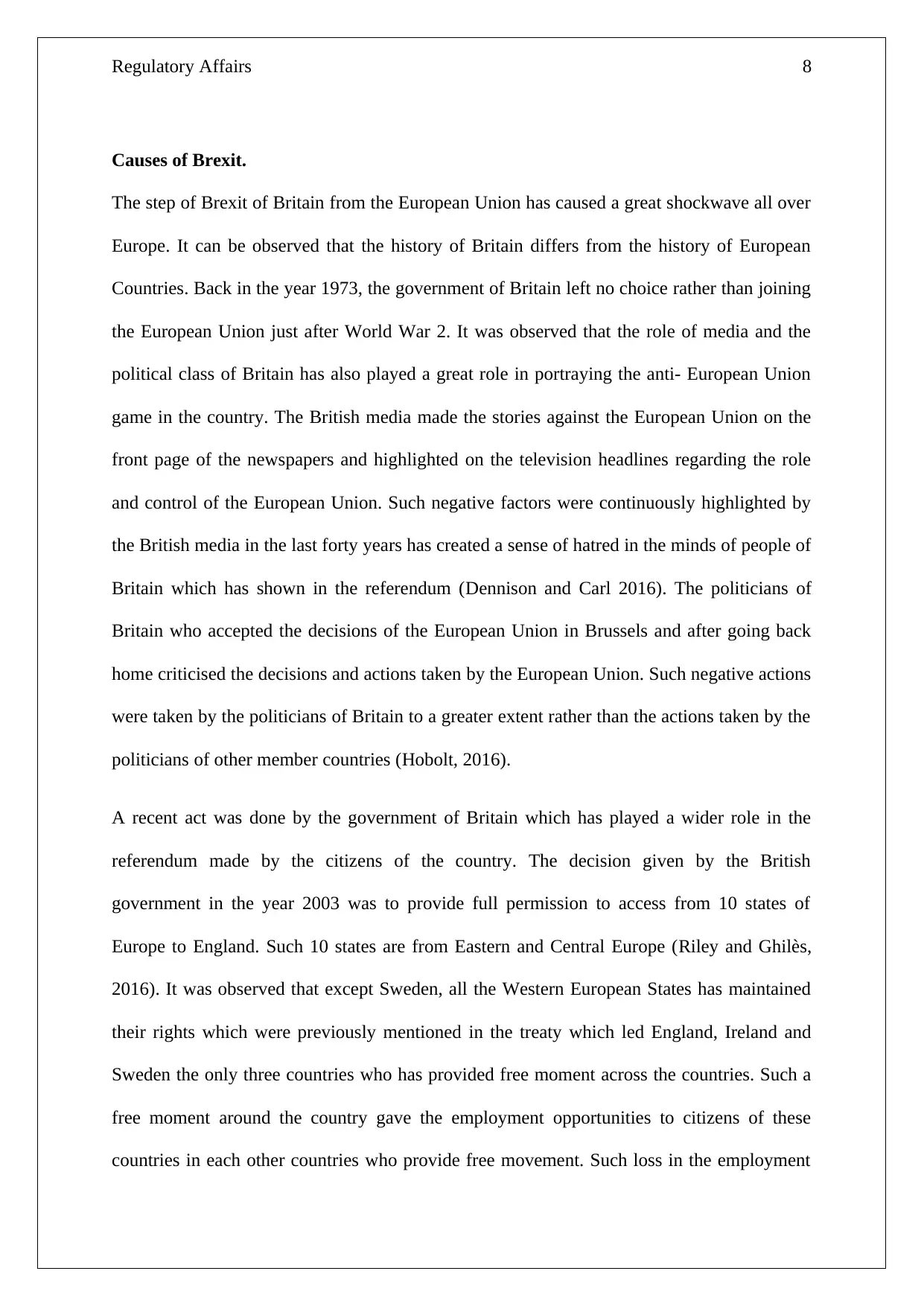
Regulatory Affairs 8
Causes of Brexit.
The step of Brexit of Britain from the European Union has caused a great shockwave all over
Europe. It can be observed that the history of Britain differs from the history of European
Countries. Back in the year 1973, the government of Britain left no choice rather than joining
the European Union just after World War 2. It was observed that the role of media and the
political class of Britain has also played a great role in portraying the anti- European Union
game in the country. The British media made the stories against the European Union on the
front page of the newspapers and highlighted on the television headlines regarding the role
and control of the European Union. Such negative factors were continuously highlighted by
the British media in the last forty years has created a sense of hatred in the minds of people of
Britain which has shown in the referendum (Dennison and Carl 2016). The politicians of
Britain who accepted the decisions of the European Union in Brussels and after going back
home criticised the decisions and actions taken by the European Union. Such negative actions
were taken by the politicians of Britain to a greater extent rather than the actions taken by the
politicians of other member countries (Hobolt, 2016).
A recent act was done by the government of Britain which has played a wider role in the
referendum made by the citizens of the country. The decision given by the British
government in the year 2003 was to provide full permission to access from 10 states of
Europe to England. Such 10 states are from Eastern and Central Europe (Riley and Ghilès,
2016). It was observed that except Sweden, all the Western European States has maintained
their rights which were previously mentioned in the treaty which led England, Ireland and
Sweden the only three countries who has provided free moment across the countries. Such a
free moment around the country gave the employment opportunities to citizens of these
countries in each other countries who provide free movement. Such loss in the employment
Causes of Brexit.
The step of Brexit of Britain from the European Union has caused a great shockwave all over
Europe. It can be observed that the history of Britain differs from the history of European
Countries. Back in the year 1973, the government of Britain left no choice rather than joining
the European Union just after World War 2. It was observed that the role of media and the
political class of Britain has also played a great role in portraying the anti- European Union
game in the country. The British media made the stories against the European Union on the
front page of the newspapers and highlighted on the television headlines regarding the role
and control of the European Union. Such negative factors were continuously highlighted by
the British media in the last forty years has created a sense of hatred in the minds of people of
Britain which has shown in the referendum (Dennison and Carl 2016). The politicians of
Britain who accepted the decisions of the European Union in Brussels and after going back
home criticised the decisions and actions taken by the European Union. Such negative actions
were taken by the politicians of Britain to a greater extent rather than the actions taken by the
politicians of other member countries (Hobolt, 2016).
A recent act was done by the government of Britain which has played a wider role in the
referendum made by the citizens of the country. The decision given by the British
government in the year 2003 was to provide full permission to access from 10 states of
Europe to England. Such 10 states are from Eastern and Central Europe (Riley and Ghilès,
2016). It was observed that except Sweden, all the Western European States has maintained
their rights which were previously mentioned in the treaty which led England, Ireland and
Sweden the only three countries who has provided free moment across the countries. Such a
free moment around the country gave the employment opportunities to citizens of these
countries in each other countries who provide free movement. Such loss in the employment
⊘ This is a preview!⊘
Do you want full access?
Subscribe today to unlock all pages.

Trusted by 1+ million students worldwide
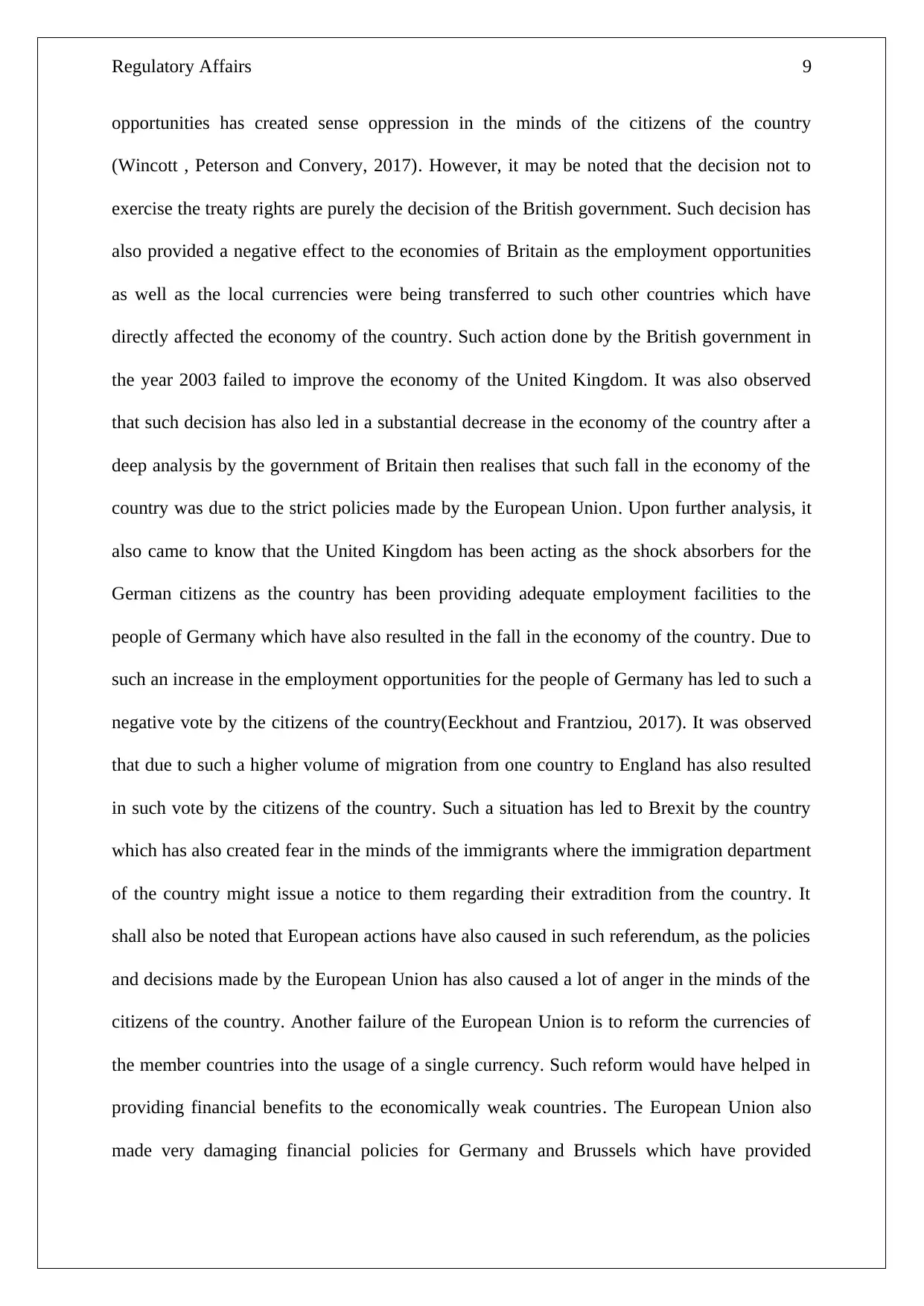
Regulatory Affairs 9
opportunities has created sense oppression in the minds of the citizens of the country
(Wincott , Peterson and Convery, 2017). However, it may be noted that the decision not to
exercise the treaty rights are purely the decision of the British government. Such decision has
also provided a negative effect to the economies of Britain as the employment opportunities
as well as the local currencies were being transferred to such other countries which have
directly affected the economy of the country. Such action done by the British government in
the year 2003 failed to improve the economy of the United Kingdom. It was also observed
that such decision has also led in a substantial decrease in the economy of the country after a
deep analysis by the government of Britain then realises that such fall in the economy of the
country was due to the strict policies made by the European Union. Upon further analysis, it
also came to know that the United Kingdom has been acting as the shock absorbers for the
German citizens as the country has been providing adequate employment facilities to the
people of Germany which have also resulted in the fall in the economy of the country. Due to
such an increase in the employment opportunities for the people of Germany has led to such a
negative vote by the citizens of the country(Eeckhout and Frantziou, 2017). It was observed
that due to such a higher volume of migration from one country to England has also resulted
in such vote by the citizens of the country. Such a situation has led to Brexit by the country
which has also created fear in the minds of the immigrants where the immigration department
of the country might issue a notice to them regarding their extradition from the country. It
shall also be noted that European actions have also caused in such referendum, as the policies
and decisions made by the European Union has also caused a lot of anger in the minds of the
citizens of the country. Another failure of the European Union is to reform the currencies of
the member countries into the usage of a single currency. Such reform would have helped in
providing financial benefits to the economically weak countries. The European Union also
made very damaging financial policies for Germany and Brussels which have provided
opportunities has created sense oppression in the minds of the citizens of the country
(Wincott , Peterson and Convery, 2017). However, it may be noted that the decision not to
exercise the treaty rights are purely the decision of the British government. Such decision has
also provided a negative effect to the economies of Britain as the employment opportunities
as well as the local currencies were being transferred to such other countries which have
directly affected the economy of the country. Such action done by the British government in
the year 2003 failed to improve the economy of the United Kingdom. It was also observed
that such decision has also led in a substantial decrease in the economy of the country after a
deep analysis by the government of Britain then realises that such fall in the economy of the
country was due to the strict policies made by the European Union. Upon further analysis, it
also came to know that the United Kingdom has been acting as the shock absorbers for the
German citizens as the country has been providing adequate employment facilities to the
people of Germany which have also resulted in the fall in the economy of the country. Due to
such an increase in the employment opportunities for the people of Germany has led to such a
negative vote by the citizens of the country(Eeckhout and Frantziou, 2017). It was observed
that due to such a higher volume of migration from one country to England has also resulted
in such vote by the citizens of the country. Such a situation has led to Brexit by the country
which has also created fear in the minds of the immigrants where the immigration department
of the country might issue a notice to them regarding their extradition from the country. It
shall also be noted that European actions have also caused in such referendum, as the policies
and decisions made by the European Union has also caused a lot of anger in the minds of the
citizens of the country. Another failure of the European Union is to reform the currencies of
the member countries into the usage of a single currency. Such reform would have helped in
providing financial benefits to the economically weak countries. The European Union also
made very damaging financial policies for Germany and Brussels which have provided
Paraphrase This Document
Need a fresh take? Get an instant paraphrase of this document with our AI Paraphraser
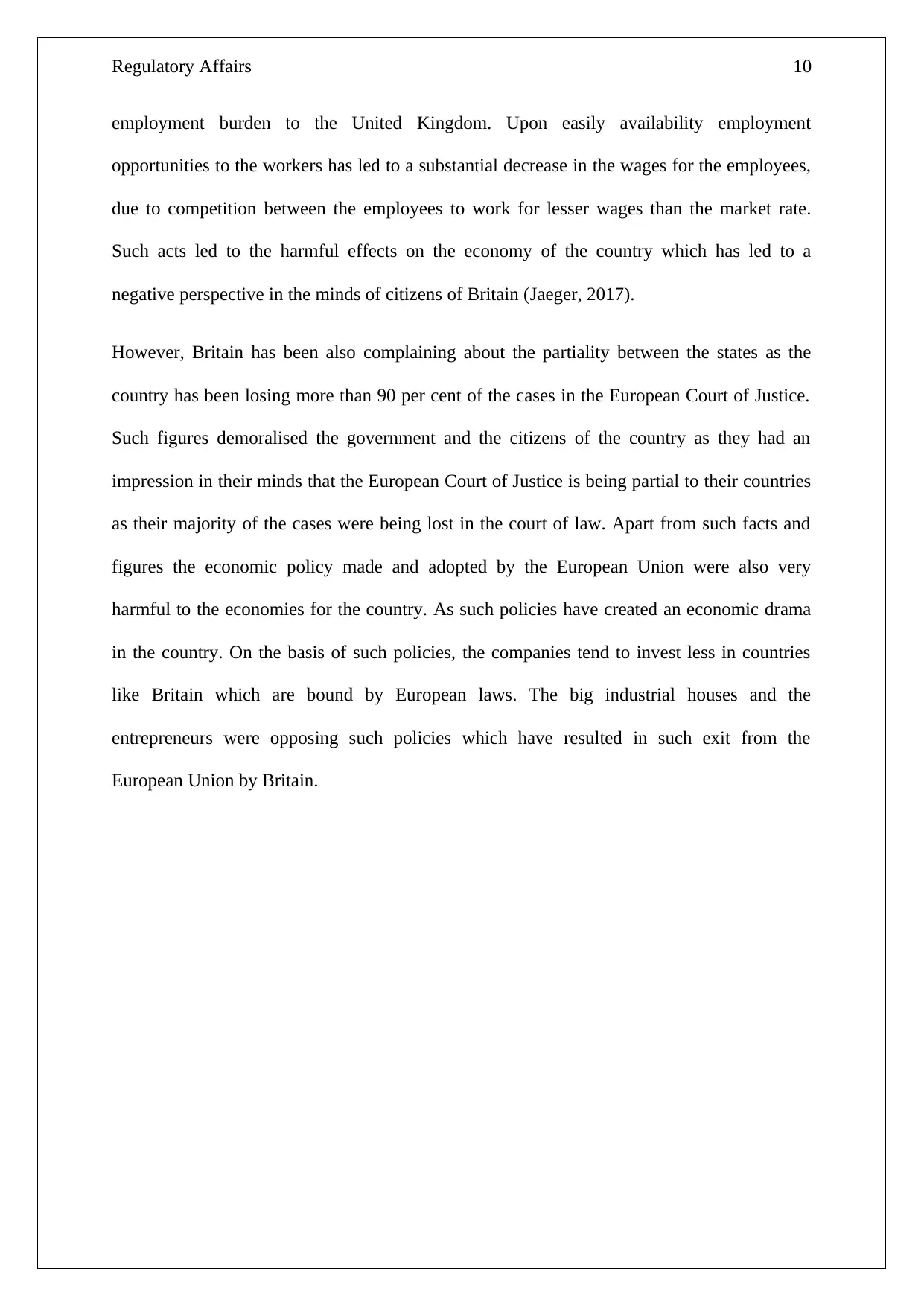
Regulatory Affairs 10
employment burden to the United Kingdom. Upon easily availability employment
opportunities to the workers has led to a substantial decrease in the wages for the employees,
due to competition between the employees to work for lesser wages than the market rate.
Such acts led to the harmful effects on the economy of the country which has led to a
negative perspective in the minds of citizens of Britain (Jaeger, 2017).
However, Britain has been also complaining about the partiality between the states as the
country has been losing more than 90 per cent of the cases in the European Court of Justice.
Such figures demoralised the government and the citizens of the country as they had an
impression in their minds that the European Court of Justice is being partial to their countries
as their majority of the cases were being lost in the court of law. Apart from such facts and
figures the economic policy made and adopted by the European Union were also very
harmful to the economies for the country. As such policies have created an economic drama
in the country. On the basis of such policies, the companies tend to invest less in countries
like Britain which are bound by European laws. The big industrial houses and the
entrepreneurs were opposing such policies which have resulted in such exit from the
European Union by Britain.
employment burden to the United Kingdom. Upon easily availability employment
opportunities to the workers has led to a substantial decrease in the wages for the employees,
due to competition between the employees to work for lesser wages than the market rate.
Such acts led to the harmful effects on the economy of the country which has led to a
negative perspective in the minds of citizens of Britain (Jaeger, 2017).
However, Britain has been also complaining about the partiality between the states as the
country has been losing more than 90 per cent of the cases in the European Court of Justice.
Such figures demoralised the government and the citizens of the country as they had an
impression in their minds that the European Court of Justice is being partial to their countries
as their majority of the cases were being lost in the court of law. Apart from such facts and
figures the economic policy made and adopted by the European Union were also very
harmful to the economies for the country. As such policies have created an economic drama
in the country. On the basis of such policies, the companies tend to invest less in countries
like Britain which are bound by European laws. The big industrial houses and the
entrepreneurs were opposing such policies which have resulted in such exit from the
European Union by Britain.
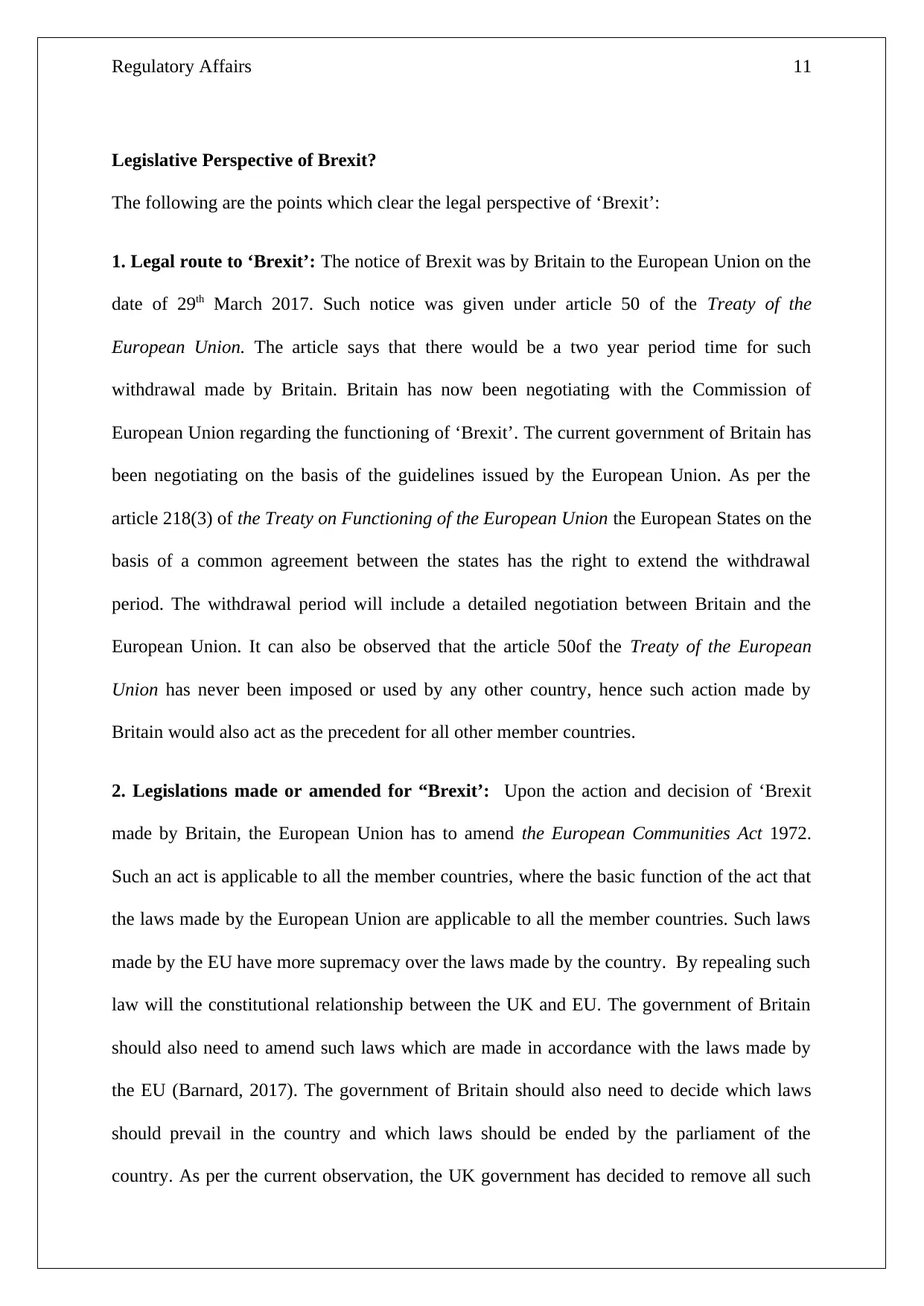
Regulatory Affairs 11
Legislative Perspective of Brexit?
The following are the points which clear the legal perspective of ‘Brexit’:
1. Legal route to ‘Brexit’: The notice of Brexit was by Britain to the European Union on the
date of 29th March 2017. Such notice was given under article 50 of the Treaty of the
European Union. The article says that there would be a two year period time for such
withdrawal made by Britain. Britain has now been negotiating with the Commission of
European Union regarding the functioning of ‘Brexit’. The current government of Britain has
been negotiating on the basis of the guidelines issued by the European Union. As per the
article 218(3) of the Treaty on Functioning of the European Union the European States on the
basis of a common agreement between the states has the right to extend the withdrawal
period. The withdrawal period will include a detailed negotiation between Britain and the
European Union. It can also be observed that the article 50of the Treaty of the European
Union has never been imposed or used by any other country, hence such action made by
Britain would also act as the precedent for all other member countries.
2. Legislations made or amended for “Brexit’: Upon the action and decision of ‘Brexit
made by Britain, the European Union has to amend the European Communities Act 1972.
Such an act is applicable to all the member countries, where the basic function of the act that
the laws made by the European Union are applicable to all the member countries. Such laws
made by the EU have more supremacy over the laws made by the country. By repealing such
law will the constitutional relationship between the UK and EU. The government of Britain
should also need to amend such laws which are made in accordance with the laws made by
the EU (Barnard, 2017). The government of Britain should also need to decide which laws
should prevail in the country and which laws should be ended by the parliament of the
country. As per the current observation, the UK government has decided to remove all such
Legislative Perspective of Brexit?
The following are the points which clear the legal perspective of ‘Brexit’:
1. Legal route to ‘Brexit’: The notice of Brexit was by Britain to the European Union on the
date of 29th March 2017. Such notice was given under article 50 of the Treaty of the
European Union. The article says that there would be a two year period time for such
withdrawal made by Britain. Britain has now been negotiating with the Commission of
European Union regarding the functioning of ‘Brexit’. The current government of Britain has
been negotiating on the basis of the guidelines issued by the European Union. As per the
article 218(3) of the Treaty on Functioning of the European Union the European States on the
basis of a common agreement between the states has the right to extend the withdrawal
period. The withdrawal period will include a detailed negotiation between Britain and the
European Union. It can also be observed that the article 50of the Treaty of the European
Union has never been imposed or used by any other country, hence such action made by
Britain would also act as the precedent for all other member countries.
2. Legislations made or amended for “Brexit’: Upon the action and decision of ‘Brexit
made by Britain, the European Union has to amend the European Communities Act 1972.
Such an act is applicable to all the member countries, where the basic function of the act that
the laws made by the European Union are applicable to all the member countries. Such laws
made by the EU have more supremacy over the laws made by the country. By repealing such
law will the constitutional relationship between the UK and EU. The government of Britain
should also need to amend such laws which are made in accordance with the laws made by
the EU (Barnard, 2017). The government of Britain should also need to decide which laws
should prevail in the country and which laws should be ended by the parliament of the
country. As per the current observation, the UK government has decided to remove all such
⊘ This is a preview!⊘
Do you want full access?
Subscribe today to unlock all pages.

Trusted by 1+ million students worldwide
1 out of 18
Related Documents
Your All-in-One AI-Powered Toolkit for Academic Success.
+13062052269
info@desklib.com
Available 24*7 on WhatsApp / Email
![[object Object]](/_next/static/media/star-bottom.7253800d.svg)
Unlock your academic potential
Copyright © 2020–2026 A2Z Services. All Rights Reserved. Developed and managed by ZUCOL.




